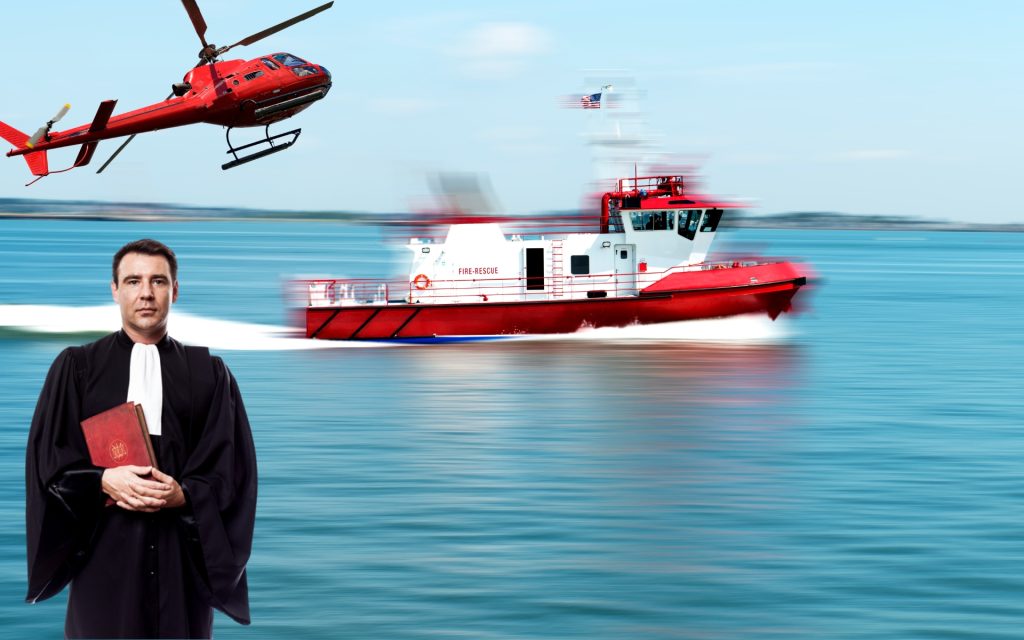What is the First Action Required of a Boat Operator Who is Involved in a Boating Accident?
The first action required of a boat operator who is involved in a boating accident can vary depending on the specific circumstances and location, as boating laws and regulations may differ in different jurisdictions. However, there are some general steps that boat operators should typically take after a boating accident, which may include:
Table of Contents
Toggle- Ensuring the safety of all passengers and crew on board, as well as other individuals involved in the accident. This may include providing immediate medical attention to anyone who is injured and taking steps to prevent further harm or danger.
- Reporting the accident to the relevant authorities, such as the local law enforcement agency, the U.S. Coast Guard, or other maritime authorities, as required by law. This may involve providing details about the accident, including the location, time, and nature of the incident, as well as the names and contact information of all parties involved.
- Exchanging information with other parties involved in the accident, such as exchanging contact information, insurance details, and boat registration numbers. It’s important to gather as much information as possible to assist with any potential legal or insurance claims that may arise from the accident.
- Preserving the scene of the accident and not leaving the scene unless it is necessary to seek help or to ensure the safety of individuals involved. This may involve taking photos or notes of the accident scene, including the positions of the boats involved, any visible damages, and other relevant details.
- Cooperating with authorities, such as law enforcement officers or investigators, as they conduct their investigation into the accident. This may include providing statements, answering questions, and following any instructions or requests from the authorities.
It’s important to note that boating laws and regulations can vary by jurisdiction, so it’s crucial to familiarize yourself with the specific rules and requirements in your area. In the event of a boating accident, it’s always recommended to prioritize safety, report the incident to the appropriate authorities, and cooperate with any investigations or legal processes that may follow.
Boating Accident Attorney
If you’ve been involved in a boating accident and suffered injuries or damages, it’s important to seek legal assistance from a boating accident attorney. Boating accidents can be complex legal matters, and having an experienced attorney by your side can help protect your rights and pursue compensation for your losses.
Here are some key points to consider when looking for a boating accident attorney:
- Experience in boating accidents: Look for an attorney who has specific experience in handling boating accident cases. Boating accidents may involve maritime law, federal regulations, and state laws, so it’s important to have an attorney who is well-versed in these areas.
- Knowledge of boating regulations: Boating accidents are often subject to federal and state boating regulations. An experienced attorney should have a deep understanding of these regulations and how they apply to your case.
- Track record of success: Look for an attorney with a proven track record of success in handling boating accident cases. Check their past results and reviews from previous clients to assess their competence and effectiveness.
- Personal injury expertise: Boating accidents often result in personal injuries, so it’s crucial to find an attorney who specializes in personal injury law. They should have experience in handling similar cases and be able to advocate for your rights to seek compensation for medical bills, lost wages, pain and suffering, and other damages.
- Trial experience: While most boating accident cases are settled outside of court, it’s important to find an attorney who has trial experience in case your case goes to court. A skilled litigator can effectively represent your interests in the courtroom if necessary.
- Good communication and responsiveness: Your attorney should be responsive to your inquiries and keep you updated on the progress of your case. Clear communication and responsiveness are key factors in building trust and ensuring a smooth attorney-client relationship.
- Fee structure: Understand the attorney’s fee structure and discuss it upfront. Some attorneys work on a contingency fee basis, meaning they only get paid if they win your case, while others may charge an hourly rate or a flat fee. Make sure you have a clear understanding of the fees and expenses associated with your case.
- Professionalism and integrity: Look for an attorney who demonstrates professionalism and integrity in their practice. They should prioritize your best interests, be honest and transparent, and maintain the highest ethical standards.
Boating accidents can have serious legal implications, and hiring an experienced boating accident attorney can greatly increase your chances of obtaining fair compensation for your injuries and damages. Be sure to do your research, ask for referrals, and choose an attorney who is knowledgeable, experienced, and trustworthy.
Boating Accident What is the proper procedure to follow in case of a boating accident?
In the event of a boating accident, it’s important to follow proper procedures to ensure the safety of everyone involved and to protect your legal rights. Here are the key steps to take:
- Ensure safety of everyone involved
- Report the accident to relevant authorities
- Exchange contact information with other parties and gather witness information
- Document the scene with photos or videos
- Seek medical attention
- Avoid admitting fault
- Contact a boating accident attorney for legal assistance
- Follow legal requirements and regulations related to boating accidents.
What should boaters do when operating a vessel on different waterways?
When operating a vessel on different waterways, boaters should follow certain guidelines to ensure safety and compliance with regulations. Here are some key points to keep in mind:
- Familiarize yourself with local laws and regulations: Different waterways may have specific laws and regulations that boaters must adhere to, such as speed limits, navigation rules, and equipment requirements. Familiarize yourself with the local laws and regulations of each waterway you plan to navigate.
- Obtain necessary permits or licenses: Some waterways may require boaters to obtain permits or licenses before operating a vessel. Make sure you have all the necessary permits or licenses for each waterway you intend to use and comply with any registration or documentation requirements.
- Follow navigation rules: Navigation rules, also known as “rules of the road,” govern the safe operation of vessels on waterways. Familiarize yourself with these rules, which may vary depending on the type and size of vessel, and follow them at all times to avoid collisions and ensure safe navigation.
- Be aware of waterway conditions: Different waterways may have varying conditions, such as tides, currents, water depths, and hazards like rocks, sandbars, or submerged objects. Stay informed about the waterway conditions, weather forecasts, and any potential hazards to plan your route and operate your vessel safely.
- Use proper safety equipment: Ensure that your vessel is equipped with all the required safety equipment, such as life jackets, navigation lights, fire extinguishers, and distress signals. Use them as required by local regulations and ensure they are in good working condition.
To minimize the risk of an accident, what should you do if your group plans to consume alcohol?
If your group plans to consume alcohol while boating, it’s important to take steps to minimize the risk of an accident. Here are some key recommendations:
- Designate a sober operator: Choose a designated operator who will refrain from consuming alcohol or any other impairing substances and be responsible for operating the vessel. This person should be experienced, familiar with boating safety rules, and capable of safely navigating the waterways.
- Avoid excessive alcohol consumption: Limit the amount of alcohol consumed by all passengers on the boat, including the designated operator. Excessive alcohol consumption can impair judgment, reaction time, and coordination, which can increase the risk of accidents.
- Know the legal limits: Familiarize yourself with the legal blood alcohol concentration (BAC) limits for boating in your area. In many jurisdictions, the legal BAC limit for operating a vessel is lower than the limit for driving a vehicle on land.
- Stay hydrated and eat food: Drink plenty of water and eat food before and during your boating trip. This can help to slow down the absorption of alcohol and reduce its effects on your body.
- Have alternative transportation options: Plan for alternative transportation options, such as a designated driver, taxi, or ride-sharing service, in case anyone in your group becomes impaired and is unable to operate the vessel safely.
Which of these accidents involving property damage requires the operator to report the accident?
The specific requirements for reporting boating accidents involving property damage may vary depending on the jurisdiction and local regulations. However, in general, boating accidents involving property damage that may require the operator to report the accident to the relevant authorities can include:
- Accidents involving collisions with other vessels, docks, piers, buoys, or other fixed objects that result in property damage.
- Accidents involving grounding, capsizing, or flooding of the vessel that results in property damage.
- Accidents involving damage to marinas, structures, or other property caused by the vessel.
- Accidents involving damage to other boats, docks, or property caused by the wake or wash of the vessel.
- Accidents involving property damage caused by negligent or reckless operation of the vessel, such as speeding, improper navigation, or failure to follow navigation rules.
Which condition requires that you report a boating accident to the Alabama marine police division?
In the state of Alabama, boating accidents must be reported to the Alabama Marine Police Division under the following conditions:
- Fatalities: If a boating accident results in the death of any person, regardless of the cause, it must be reported to the Alabama Marine Police Division immediately.
- Injuries: If a boating accident results in an injury that requires medical treatment beyond first aid, it must be reported to the Alabama Marine Police Division within 48 hours.
- Disappearance of a person: If a person is involved in a boating accident and disappears from the vessel under circumstances that indicate death or injury, the accident must be reported to the Alabama Marine Police Division immediately.
- Property damage: If a boating accident results in property damage exceeding $500, it must be reported to the Alabama Marine Police Division within 10 days.
When is a written boating accident report required?
A written boating accident report may be required in the following situations:
- Fatality: If a boating accident results in the death of any person, a written boating accident report is generally required. This is typically the case regardless of the cause of death or the circumstances of the accident.
- Personal injury: If a boating accident results in an injury that requires medical treatment beyond first aid, a written boating accident report may be required. The threshold for requiring a written report for personal injuries can vary by jurisdiction, so it’s important to be aware of the local regulations.
- Disappearance of a person: If a person is involved in a boating accident and disappears from the vessel under circumstances that indicate death or injury, a written boating accident report may be required. This typically applies even if a body has not been recovered.
- Damage to vessel or property: If a boating accident results in significant damage to a vessel or property, a written boating accident report may be required. The threshold for requiring a written report for property damage can vary by jurisdiction, so it’s important to be aware of the local regulations.
It’s important to note that the specific requirements for written boating accident reports may vary by jurisdiction, and it’s the responsibility of the boat operator to be aware of and comply with the local regulations regarding boating accident reporting. In case of any doubt, it’s best to contact the relevant authorities or marine enforcement agency for guidance.




